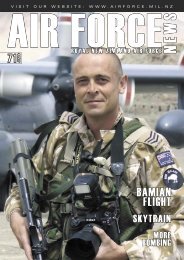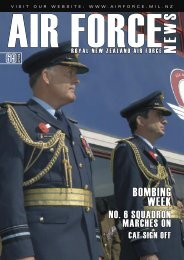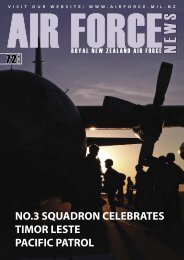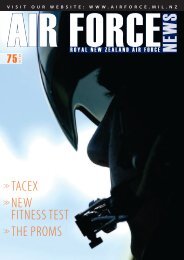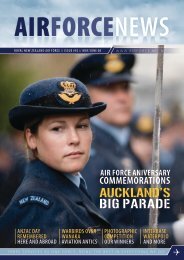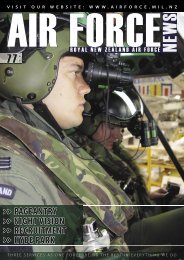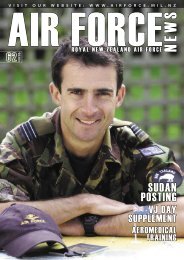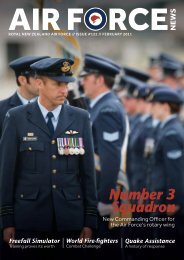February 2007, Issue 78 [pdf 3mb, 44 pages] - Royal New Zealand ...
February 2007, Issue 78 [pdf 3mb, 44 pages] - Royal New Zealand ...
February 2007, Issue 78 [pdf 3mb, 44 pages] - Royal New Zealand ...
You also want an ePaper? Increase the reach of your titles
YUMPU automatically turns print PDFs into web optimized ePapers that Google loves.
18<br />
A F G H A N I S T A N<br />
BAMYAN, AFGHANISTAN<br />
THREE YEARS ON<br />
SQNLDR Peter Cochran was part of the first deployment to Afghanistan in 2003. He returned to<br />
Afghanistan late last year as a Patrol Commander in the ninth Kiwi Provincial Reconstruction Team (PRT)<br />
rotation. In this article he reflects on the changes that have taken place since he was first there.<br />
When I arrived with the <strong>New</strong> <strong>Zealand</strong><br />
Defence Force on the first Kiwi deployment<br />
to Afghanistan in September 2003,<br />
I saw the poor, war-weary people of<br />
Bamyan, struggling to get their lives<br />
back to normal. Many were refugees<br />
returning home from Iran or Pakistan, to<br />
houses and villages, amidst a harsh and<br />
unforgiving mountainous environment,<br />
totally destroyed by the Taliban. There were<br />
many fatherless families and the economic<br />
situation was desperate.<br />
Despite these hardships these people<br />
showed the coalition forces a gratitude<br />
and hospitality, which was amazing<br />
and very humbling. We were seen both<br />
as the liberators and the means for<br />
rehabilitation - and to future prosperity.<br />
While it was great to feel such gratitude,<br />
we all realised that there was a huge task<br />
ahead. We had to operate in a tough<br />
and desolate environment and fulfil many<br />
future expectations. On my return three<br />
years later with the latest rotation of NZ<br />
troops I was interested to see whether<br />
things had improved and whether the Kiwis<br />
were still welcome.<br />
After twenty years of war and dislocation,<br />
there were two major concerns. First, there<br />
was a huge lack of obvious structures<br />
like schools, clinics, roads and bridges.<br />
Second, the social system was based<br />
on a feudal-like fealty towards the local<br />
Warlord. As such there was almost no<br />
local government infrastructure and little<br />
confidence in a central democratic system.<br />
Due to the war, a generation had largely<br />
gone without any education. While<br />
there was a desire to get the children<br />
back to school immediately, we often<br />
ran into struggling teachers who hadn’t<br />
been paid for six months because of the<br />
limited administration. In other areas,<br />
independent and haphazard aid was<br />
given by many aid agencies, but this aid<br />
was of the “quick and obvious” type.<br />
Few agencies wanted to channel their<br />
resources into the less glamorous areas<br />
of training, systems development, and<br />
infrastructure. In yet another area, due to<br />
the uncertainty of the future, most people<br />
still had weapons hidden – especially the<br />
Warlords - and understandably they were<br />
reluctant to surrender them. Until the threat<br />
of war was gone, no military commander<br />
was willing to hand in his means of selfprotection.<br />
The civil police network was<br />
almost non-existent and the policemen<br />
were untrained, poorly paid, and forced<br />
to rely on bribes and kickbacks to survive.<br />
In a country that was still in conflict - a<br />
truly daunting task lay ahead. This was<br />
the situation we faced when <strong>New</strong> <strong>Zealand</strong><br />
first arrived in Bamyan. On my return three<br />
years later, I was in a unique position to<br />
judge the changes the NZPRT and others<br />
had made in Bamyan, Afghanistan.<br />
The proverb about not building Rome in<br />
a day can apply equally to Afghanistan.<br />
I think the rebuild would need to be<br />
stretched to a decade or two. Nonetheless,<br />
in three years there have definitely been<br />
many substantial changes in the Bamyan<br />
area. Stand-out visual differences include<br />
the many new government, police and<br />
communication facilities. The policemen<br />
are much more evident and thanks<br />
to the NZ Police input, their impact,<br />
equipment and professionalism has<br />
greatly improved. The Bamyan Bazaar<br />
looks to have tripled in size as more<br />
refugees return. Confidence has grown<br />
in security and business opportunities and<br />
there is evidence of a crude form of town<br />
planning. The condition of the roads still<br />
has a long way to go with travellers still<br />
experiencing a bone-shaking journey, but<br />
on the main routes where we often used<br />
to cross our fingers before fording the<br />
river, there are now good bridges. The<br />
On my return three years later, I was in a unique position to<br />
judge the changes the NZPRT and others had made in Bamyan,<br />
Afghanistan.<br />
road builders now also have much better<br />
plant and machinery to work with. Many<br />
of the tortuous side-roads up the valleys<br />
have now been improved – so that the<br />
farmers can at least get a truck to bring<br />
out their produce, rather than having to<br />
rely on donkeys.<br />
From a socio-economic viewpoint, it also<br />
appears that conditions have improved,<br />
especially for the central Bamyan area.<br />
There are more vans, bikes and busses<br />
on the roads and a lot of villages now<br />
have access to power thanks mainly to<br />
the many mini hydro-electric plants. Even<br />
in the out-lying areas there are noticeably<br />
more schools and many more students<br />
studying. More young people are able<br />
to speak English and are actively taking<br />
AFN<strong>78</strong> FEBRUARY 07<br />
www.airforce.mil.nz<br />
Holy Bridge as it is today - on the way to Ghandak.<br />
tertiary education in the Bazaar and at<br />
the Bamyan University. In outer areas,<br />
there are more clinics, more wells in<br />
the villages and it appears that people<br />
are more aware of preventative health<br />
practices. Agricultural practices are still<br />
very backward and labour intensive<br />
but machinery is starting to appear and<br />
there are small signs of diversification<br />
into orchards and forestry. Socially, the<br />
prominence of the old Warlords has<br />
subsided with many having handed in<br />
their weapons.<br />
It was also very encouraging for me to<br />
find the PRT was still seen by the locals<br />
to be a valuable and necessary provider<br />
of security. Moreover, the PRT was still<br />
appreciated for its provision of assistance<br />
in many areas. Although the average<br />
villager may not necessarily appreciate<br />
the part that the PRT plays in improving<br />
the central services, infrastructure and<br />
police training he or she still sees the<br />
PRT as a stabilising keeper of the peace,<br />
a source of aid, and a means to advance<br />
AFN<strong>78</strong> FEBRUARY 07<br />
www.airforce.mil.nz<br />
Holy Bridge as it was three years ago.<br />
his village’s case for access roads and<br />
general improvements. Generally the<br />
reception to the patrols is also still very<br />
positive and friendly. There are still some<br />
areas, particularly on the fringes of the<br />
region where the ethnic mix changes, still<br />
subject to outside extremist influences.<br />
WN 07-0001-23<br />
A F G H A N I S T A N<br />
Here things hang more in the balance,<br />
the sentiments are more fickle and the<br />
PRT has to work continuously to protect<br />
the security. However among the bulk<br />
of the people, there is a desire to keep<br />
the extremists marginalized and give the<br />
peace a chance.<br />
Overall I have been impressed by the<br />
improvements in a difficult environment,<br />
and believe that the PRT has played a<br />
very important part in this progress. The<br />
maintenance of security, in a country that<br />
is still at war, is obviously a huge and<br />
on-going task, but ‘In Shah Allah’ (God<br />
Willing), the Kiwis will be able to maintain<br />
the peace. As patrol commander I am<br />
often thanked by the locals for this peace,<br />
even when we are doing vehicle and<br />
personnel searches at 3am on a minus<br />
twenty degree morning! Personally I am<br />
proud of the fact that the original cheerful<br />
acknowledgement and acceptance of our<br />
patrols has not diminished since my last<br />
tour and it is obvious that the Kiwis are<br />
still very welcome.<br />
WN 07-0001-23<br />
19


![February 2007, Issue 78 [pdf 3mb, 44 pages] - Royal New Zealand ...](https://img.yumpu.com/17485296/18/500x640/february-2007-issue-78-pdf-3mb-44-pages-royal-new-zealand-.jpg)
